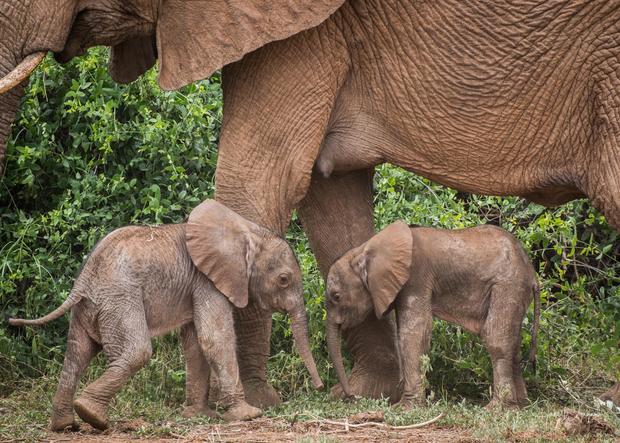An elephant in Kenya has given birth to a set of twins, a conservation group said on Friday, a rare event for the planet’s largest land mammals. Save the Elephants said that the twins, both female, were born in the Samburu National Reserve in northern Kenya to a mother named Alto, describing it as “double joy.”
Twins make up only about one percent of elephant births, although another pair — one male and one female — were born in the same reserve in early 2022.
A video posted to social media by Save the Elephants, showed the baby elephants feeding from their mother, alongside other members of the herd with the caption: “Amazing odds!”
African elephants have the largest gestation period of any living mammal, carrying their young for nearly 22 months, and give birth roughly every four years.
However, elephant twins do not often fare so well. About two years ago, an elephant named Bora gave birth to twins in the Samburu National Reserve.
“Bora’s twins (male and female) were born during one of the worst droughts but despite her excellent mothering skills, the female twin sadly died,” Save the Elephants said in a Facebook post.
Still, the conservation group says it remains optimistic about the prospects for Alto’s babies.
“Elephant twins rarely survive in the wild but we’re optimistic about Alto’s twins as there’s lots of food in the park following the rains so Alto should be able to produce plenty of milk to feed her hungry brood plus she also has the amazing support of her herd,” the group wrote.
A previous pair of twins born in Samburu in 2006 failed to survive more than a few days.
The African savanna elephant is classified as endangered by the International Union for Conservation of Nature (IUCN), which says poaching and habitat destruction had a devastating effect on elephant numbers in Africa as a whole.
According to the Kenya Wildlife Service, there are more than 36,000 elephants in the East African country, with efforts to stem poaching halting a decline in numbers.
The elephant population in Kenya stood at 170,000 in the 1970s and early 1980s but plunged to only 16,000 by the end of 1989 because of the demand for ivory, it said.

